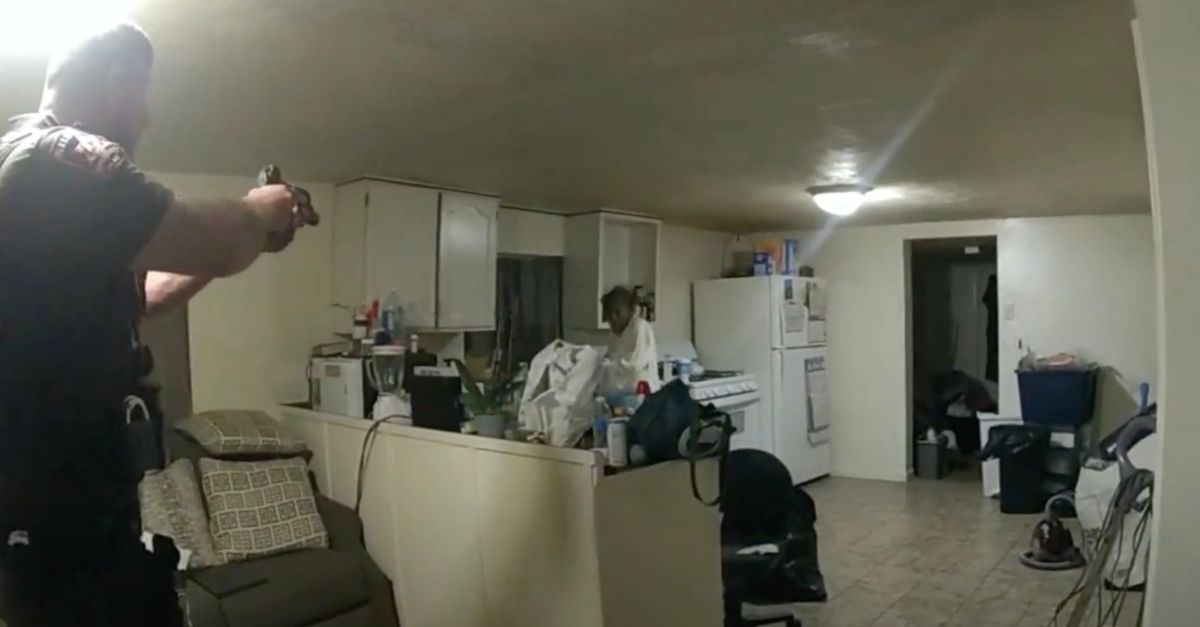
Deputy Sean Grayson is charged with the murder of Sonya Massey after shooting at her three times.
Footage from a police body camera has shown a white officer in the US state of Illinois shooting dead a 36-year-old Black woman in her home after she called 911 to report a suspected intruder.
The 36-minute video, released by Illinois State Police on Monday, shows the moments leading up to, during and after the July 6 shooting of Sonya Massey, who had called the emergency line to report a potential “prowler” at her residence in Springfield.
In the video, two deputies are seen in a tense encounter with Massey after entering her home late at night. It culminates in one of the deputies, 30-year-old Sean Grayson, yelling at Massey to put down a pot of hot water, threatening to shoot her and then three shots being fired, one hitting her fatally in the head.
Grayson was indicted last week for first-degree murder, aggravated battery with a firearm and official misconduct. He pleaded not guilty.
What led up to the shooting?
The video shows the two deputies reaching Massey’s home at about 1am.
Massey, who had undergone treatment for mental health issues, according to her family’s lawyer, immediately says, “Don’t hurt me”, and seems confused while letting the deputies in.
Inside her home, Grayson, standing in the living room, points to a pot sitting on a flame on the kitchen stove and says, “We don’t need a fire while we’re here.”
Massey retrieves the pot and unexpectedly says, “I rebuke you in the name of Jesus.”
Grayson, separated by a counter dividing the kitchen and living room, responds: “You better [expletive] not or I swear to God I’ll [expletive] shoot you in your [expletive] face.”
He then pulls out his 9mm pistol and aims it at her. She ducks behind the kitchen counter and says, “I’m sorry.”
Both deputies continue to scream “drop the [expletive] pot” before three shots are heard.

After shooting Massey, Grayson initially discourages his partner from grabbing a medical kit to save her, saying: “You can go get it, but that’s a headshot … There’s nothing you can do, man.”
Explaining himself to responding police, Grayson said, “She had boiling water and came at me, with boiling water.”
The sheriff’s office fired Grayson, saying he did not “act as trained or in accordance with our standards”.

‘Shock the conscience of America’
Massey’s family lawyer, Ben Crump, slammed Grayson’s defence in a Monday news conference, calling it “disingenuous” and said the shooting would “shock the conscience of America”.
“She needed a helping hand. She did not need a bullet to her face,” Crump said.
Massey’s father, James Wilburn, demanded the county court system be completely open with its investigation and prosecution and transparent with the public.
“The only time I will see my baby again is when I leave this world,” Wilburn said. “And I don’t ever want anybody else in the United States to join this league.”
US President Joe Biden issued a statement on Massey’s death, saying Monday it was a reminder “that all too often Black Americans face fears for their safety in ways many of the rest of us do not”.
Massey’s death is the latest incident of Black people killed by police in their homes in recent years.
In May, a Hispanic Florida sheriff’s deputy shot and killed Roger Fortson, when the Air Force senior airman opened the door of his home in Fort Walton Beach armed with a handgun pointed down. The deputy, Eddie Duran, was fired.
A white Dallas police officer fatally shot Botham Jean, who was unarmed, in 2018 after mistaking his apartment for her own. Amber Guyger, the former officer, was convicted of murder and sentenced to 10 years in prison.
“Congress must pass the George Floyd Justice in Policing Act now,” Biden said referring to the sweeping police reform package.
The death in 2020 of George Floyd, at the hands of police officer Derek Chauvin – who was filmed kneeling on the Black man’s neck for more than nine minutes in Minneapolis – prompted worldwide protests against police brutality and racism.
The measure, which was initially introduced in 2021 to stop aggressive law enforcement tactics, misconduct and racial bias, has faced repeated roadblocks in Congress and has yet to move forward.


